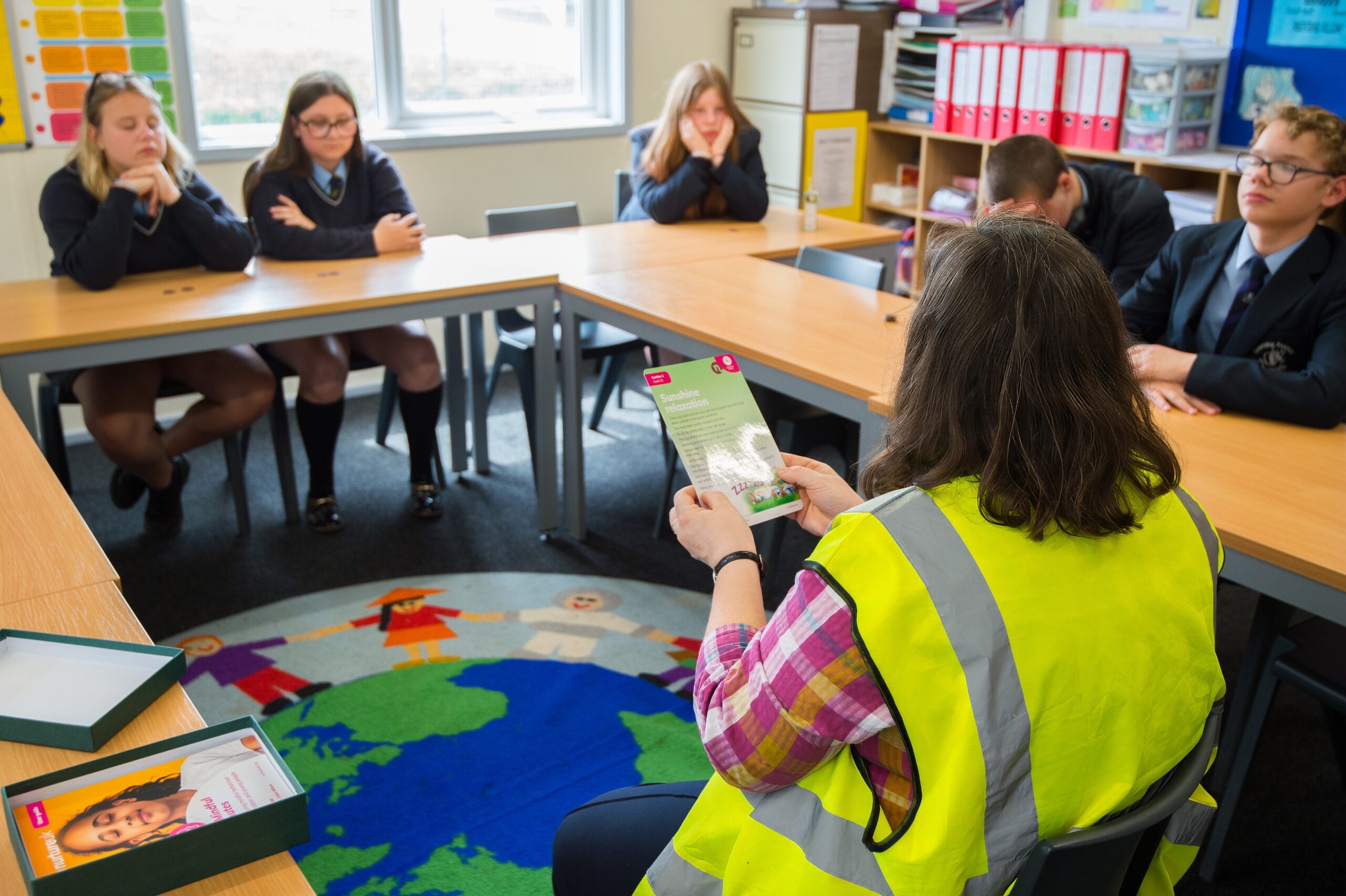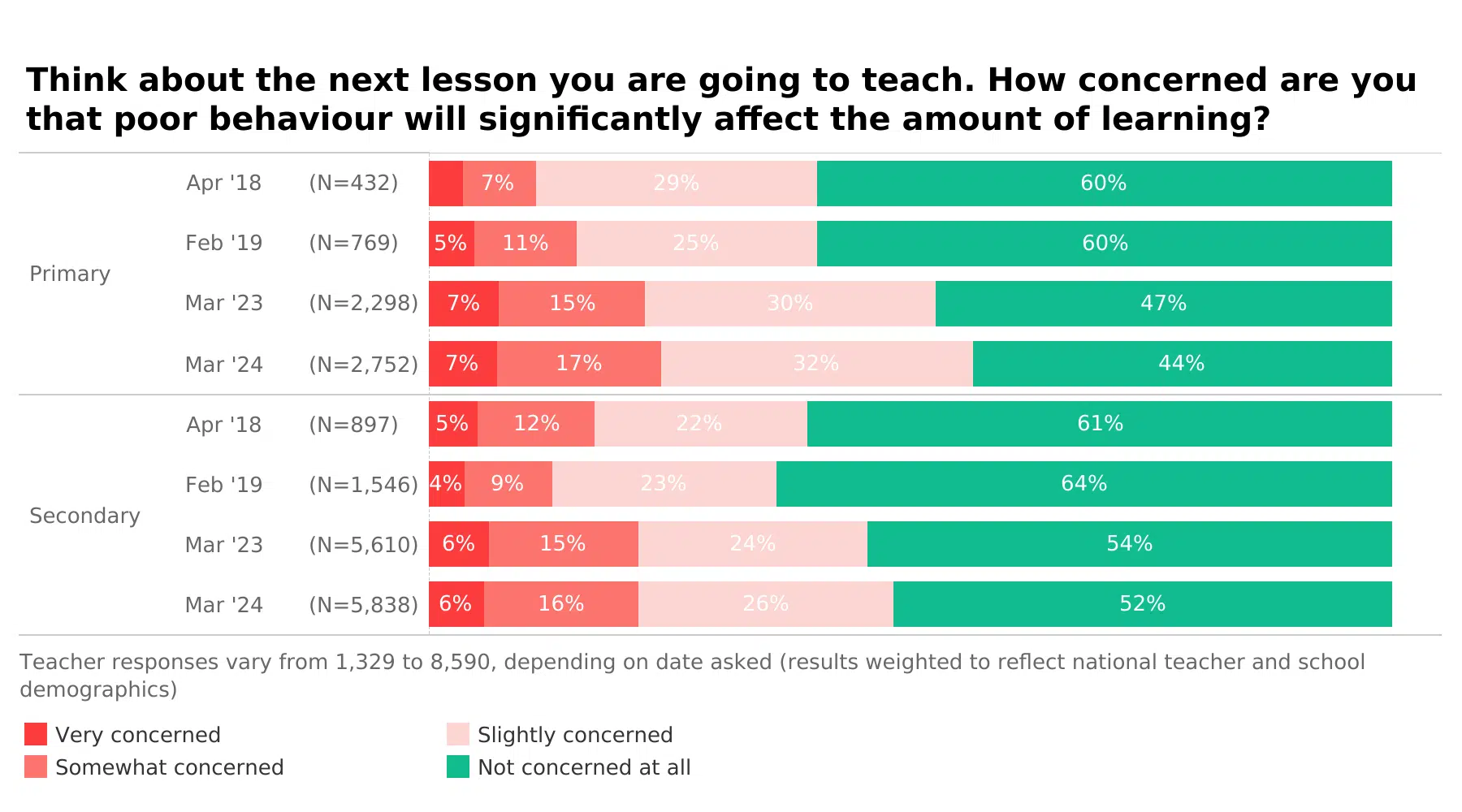Disruptive behaviour in UK schools is a significant challenge for teachers.
A Teacher Tapp survey in 2024 showed that just under half of secondary teachers were concerned about behaviour affecting learning. Just under half of primary teachers put behaviour in their top three concerns in another Teacher Tapp survey in February 2025.
As teachers’ concerns have grown, the number of suspensions has also increased, jumping by 21% between 2022/23 and 2023/24. Behaviour incidents and levels of disruption have continued to rise despite some schools adopting behaviour management policies that focus solely on sanctions and rewards.
The six principles of nurture
At nurtureuk, our work is guided by the six principles of nurture which offer a different perspective.
The nurture approach recognises that behaviour is a form of communication. This key principle can transform our response from reactive management to proactive prevention and support. As a charity, we believe that challenging behaviour usually expresses a need. A child that is withdrawing, or being defiant or disruptive is communicating something—an emotion they don’t know how to deal with, a struggle with a particular task, a feeling of anxiety, a lack of confidence or self-esteem, or an unresolved issue in school or at home.
Applying the six principles of nurture to behaviour
The six principles of nurture provide a powerful framework for understanding the behaviour you see in the classroom.
Children's learning is understood developmentally:
Behaviour is often a sign that a child's developmental stage is not aligned with the demands of the curriculum or environment.
The classroom offers a safe base:
Creating a physically and emotionally safe space is fundamental to a child feeling secure enough to learn and express themselves.
Language is a vital means of communication:
Language is understood as essential for expressing feelings appropriately, being understood to feel secure, and for fostering the emotional development necessary for self-regulation.
The importance of nurture for the development of wellbeing:
A child with low self-esteem may act out to gain attention, even if it's negative attention.
All behaviour is communication:
This is the cornerstone of the nurture approach. Instead of responding every time with sanctions, we need to look for the underlying message in a child's actions. What is this child trying to tell me?
The importance of transitions in children's lives:
Changes in school, class, or family life can be a huge source of anxiety, leading to a change in behaviour.
By embracing the principle that all behaviour is communication, your school can move beyond a punitive system. It prompts us to ask "what's wrong?" instead of "what have you done?". It invites us to look for the reasons for a child’s behaviour, not just focus on the action and its consequences. This is absolutely not about excusing poor or disruptive behaviour, but about addressing the cause so that the behaviour can change for good.
3 practical steps for your school to tackle behaviour
1. Understand your learners with the Boxall Profile® Online
The best way to preempt problems with behaviour is to ensure all children and young people in a school are assessed using the Boxall Profile® Online. This means that their social and emotional learning and mental health needs can be addressed before they result in poor behaviour.
Our unique digital tool helps you to understand the social and emotional development of the learners in your class, and pinpoint social and emotional difficulties they are experiencing. Through the strategies built into the tool, you can then plan learning activities for a child, a group or a whole class to help. If you’re a school leader, the tool can help you see at a glance where your learners are and what needs to change. Over 3,500 schools use the tool each year.
You can sign up now for a free trial, or if you already use the assessment tool, our training, e-learning and publications packs can help you get full value out of your subscription.
2. Redevelop your behaviour policy
Under the new Ofsted framework, schools in England are expected to create a calm, orderly, respectful, supportive and positive environment in which pupils can thrive. Schools that adopt the nurture approach frequently report its transformational effect in create calm, safe and supportive environments, with less disruptive behaviour. Behaviour policies are an important part of this.
The starting point for your behaviour policy should be a recognition that behaviour is a form of communication. Policies in some schools focus only on expectations of behaviour and sanctions for failure to meet these expectations, rather than acknowledging that behaviour can be evidence of unmet needs. This doesn’t mean that any behaviour is acceptable, or that there are no clear boundaries. Instead it means that we try to understand the cause, rather than jumping to a sanction that is unlikely to change the cause.
A redeveloped behaviour policy (sometimes redeveloped as a relational policy) is usually a key step for schools on our whole-school programme - the National Nurturing Schools Programme. Join the programme and you'll be under the guidance of one of our expert consultants, learning from other schools that have successfully rethought their approach to behaviour.

3. Get your team started with relational practice
Building strong relationships with children and young people is a key strategy to improve engagement, which in turn reduces disruptive or other unwanted behaviour. By fostering positive relationships between staff and pupils, you'll build a positive and respectful culture in which staff know, support and care about pupils.
Our Relational Approach E-learning will give you a deeper understanding of why positive relationships are crucial for development and learning, and help you implement practical strategies and tools to foster a stronger connections with students and the wider school community. A supportive and predictable environment can reduce the need for a child to communicate through challenging behaviour.
Case study
Strong relationships support academic success in a Croydon school
Forest Academy in Croydon historically struggled with challenging behaviour in children. While the school was already doing much to support children and families prior to working with nurtureuk, they were eager to do more, so joined the Inclusive and Nurturing Schools Programme in 2022.
The school has a clear focus on establishing strong and trusting relationships with the children. Once in the classroom, pupils check-in emotionally via their zones of regulation (blue for sad, yellow for frustrated and so on). This not only builds emotional literacy but also alerts staff to any immediate pastoral needs. Regulation stations offer calm areas in every classroom to help pupils reset, restore calm, and gain a sense of security.
Since working with nurtureuk, the school reports that pupils are more engaged in lessons with improved behaviour and significantly fewer classroom disruptions. This was also reflected in academic outcomes last year, with 83% of pupils in KS2 meeting or exceeding expectations in reading, writing, and maths - that’s 22 percentage points over the national average, in a school where 66% of pupils are eligible for pupil premium.
Start rethinking behaviour with nurtureuk
Nurtureuk can support you on your journey towards creating a calm, productive environment in your school.
Ready to explore how nurtureuk can support your school in rethinking behaviour?


